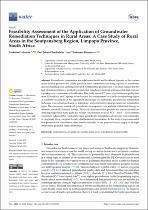| dc.contributor.author | Lalumbe, Lindelani | |
| dc.contributor.author | Oberholster, Paul Johan | |
| dc.contributor.author | Kanyerere, Thokozani | |
| dc.date.accessioned | 2022-09-09T09:22:54Z | |
| dc.date.available | 2022-09-09T09:22:54Z | |
| dc.date.issued | 2022 | |
| dc.identifier.citation | Lalumbe, L. et al. (2022). Feasibility assessment of the application of groundwater remediation techniques in rural areas: A case study of rural areas in the Soutpansberg region, Limpopo Province, South Africa. Water, 14(15), 2365. https://doi.org/10.3390/w14152365 | en_US |
| dc.identifier.issn | 2073-4441 | |
| dc.identifier.uri | https://doi.org/10.3390/w14152365 | |
| dc.identifier.uri | http://hdl.handle.net/10566/7838 | |
| dc.description.abstract | Groundwater contribution towards human health and livelihood depends on the contaminants
level in groundwater. Many people in rural communities are being exposed to waterborne
diseases resulting from drinking untreated contaminated groundwater. This study argues that the
lack of implementation of available groundwater remediation methods and associated high costs are
exposing rural communities to health risks. This study assessed 22 years of groundwater quality data
from 12 boreholes and 2 springs to understand the contaminants level in the Soutpansberg region.
A feasibility assessment of the application and design of a sustainable groundwater remediation
technique was carried out based on individual- and community-based groundwater remediation
types. | en_US |
| dc.language.iso | en | en_US |
| dc.publisher | MDPI | en_US |
| dc.subject | Groundwater quality | en_US |
| dc.subject | Rural areas | en_US |
| dc.subject | Human health | en_US |
| dc.subject | Water quality | en_US |
| dc.subject | Limpopo Province | en_US |
| dc.title | Feasibility assessment of the application of groundwater remediation techniques in rural areas: A case study of rural areas in the Soutpansberg region, Limpopo Province, South Africa | en_US |
| dc.type | Article | en_US |

